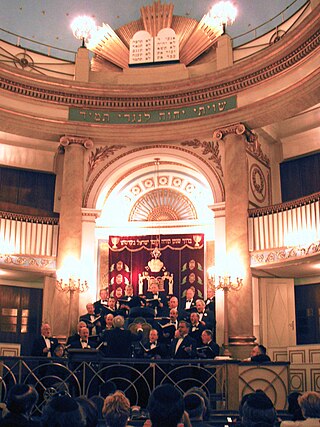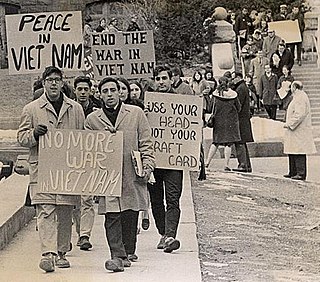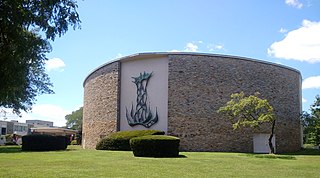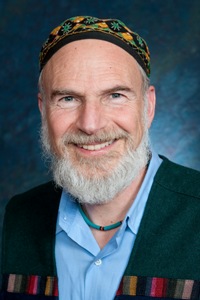
Reform Judaism, also known as Liberal Judaism or Progressive Judaism, is a major Jewish denomination that emphasizes the evolving nature of Judaism, the superiority of its ethical aspects to its ceremonial ones, and belief in a continuous revelation which is closely intertwined with human reason and not limited to the Theophany at Mount Sinai. A highly liberal strand of Judaism, it is characterized by little stress on ritual and personal observance, regarding Jewish law as non-binding and the individual Jew as autonomous, and by a great openness to external influences and progressive values.

Reconstructionist Judaism is a Jewish movement based on the concepts developed by Rabbi Mordecai Kaplan (1881–1983) that views Judaism as a progressively evolving civilization rather than just a religion. The movement originated as a semi-organized stream within Conservative Judaism, developed between the late 1920s and the 1940s before seceding in 1955, and established a rabbinical college in 1967. Reconstructionist Judaism is recognized by many scholars as one of the five major streams of Judaism in America alongside Orthodox, Conservative, Reform, and Humanistic.

Messianic Judaism is a syncretic Abrahamic new religious movement that combines various Jewish traditions with belief in Jesus of Nazareth as the Messiah. It is widely considered to be a sect of Evangelical Christianity, including by all major groups within mainstream Judaism, but the movement considers itself Jewish. Belief in Jesus as a messianic figure and as divine is considered by Jews to be one of the most defining distinctions between Judaism and Christianity.

Meshullam Zalman Schachter-Shalomi, commonly called "Reb Zalman", was one of the founders of the Jewish Renewal movement and an innovator in ecumenical dialogue.

A hazzan or chazzan is a Jewish musician or precentor trained in the vocal arts who leads the congregation in songful prayer. In English, this prayer leader is often referred to as a cantor, a term also used in Christianity.
In Judaism, a ba'al teshuvah is a Jew who adopts some form of traditional religious observance after having previously followed a secular lifestyle or a less frum form of Judaism.

Youth culture refers to the societal norms of children, adolescents, and young adults. Specifically, it comprises the processes and symbolic systems that are shared by the youth and are distinct from those of adults in the community.

Jewish Renewal is a Jewish religious movement originating in the 20th century that endeavors to reinvigorate modern Judaism with Kabbalistic, Hasidic, and musical practices. Specifically, it seeks to reintroduce the "ancient Judaic traditions of mysticism and meditation, gender equality and ecstatic prayer" to synagogue services. It is distinct from the baal teshuva movement of return to Orthodox Judaism.
The Union for Reform Judaism (URJ), formerly known as the Union of American Hebrew Congregations (UAHC) until 2003, founded in 1873 by Rabbi Isaac Mayer Wise, is the congregational arm of Reform Judaism in North America. The other two arms established by Rabbi Wise are the Hebrew Union College-Jewish Institute of Religion and the Central Conference of American Rabbis. The current president of the URJ is Rabbi Rick Jacobs.
The Union of Orthodox Rabbis of the United States and Canada (UOR), often called by its Hebrew name, Agudath Harabonim or (in Ashkenazi Hebrew) Agudas Harabonim ("union of rabbis"), was established in 1901 in the United States and is the oldest organization of Orthodox rabbis in the United States. It had been for many years the principal group for such rabbis, though in recent years it has lost much of its former membership and influence.

Chizuk Amuno Congregation is a Conservative Jewish congregation and synagogue, located on Stevenson Road, in Pikesville, a suburb of Baltimore, Maryland, in the United States.
Rav is the Hebrew generic term for a person who teaches Torah or is a Jewish spiritual guide or a rabbi. For example, Pirkei Avot states (1:6) that:
(..) Joshua ben Perachiah says, "Set up a teacher [RaB] for yourself. And get yourself a friend [HaBeR]. And give everybody the benefit of the doubt."
The history of the Jews in Omaha, Nebraska, goes back to the mid-1850s.

Mordechai Eliyahu Liebling is a rabbi, educator, and activist who has led Jewish and interfaith organizations dedicated to social justice missions. He founded the Social Justice Organizing Program at the Reconstructionist Rabbinical College (RRC) to provide student rabbis training for engaging in the work of tikkun olam, Hebrew for "repair of the world".
A singles' event is an activity or program made available specifically to the romantically unattached, often with the underlying or explicit purpose of fostering dating or relationships among attendees.
Orthodox Jewish feminism is a movement in Orthodox Judaism which seeks to further the cause of a more egalitarian approach to Jewish practice within the bounds of Jewish Law. The major organizations of this movement is the Jewish Orthodox Feminist Alliance (JOFA) in North America, and Women of the Wall (WOW) and its affiliates in Israel and internationally, known as The International Committee for Women of the Wall (ICWOW). In Israel, the leading Orthodox feminist organization is Kolech, founded by Dr. Chana Kehat. In Australia, there is one Orthodox partnership minyan, Shira Hadasha, in Melbourne.

The Jewish Center is a Modern Orthodox Jewish synagogue located at 131 West 86th Street, on the Upper West Side of Manhattan, in New York City, New York, United States.
An independent minyan is a lay-led Jewish worship and study community that has developed independently of established denominational and synagogue structures within the organized Jewish community. Some began in the late 1990s and most since the year 2000, though some are several decades older. These new groups often combine a commitment to halakha/Jewish law with egalitarianism, and strive to create worship services where traditional prayer can become "spiritual experiences".

Steven M. Cohen is an American sociologist whose work focuses on the American Jewish Community. He served as a Research Professor of Jewish Social Policy at Hebrew Union College-Jewish Institute of Religion and as Director of the Berman Jewish Policy Archive at Stanford University before his July 2018 resignation stemming from allegations of sexual harassment.

Society Hill Synagogue is an unaffiliated Jewish congregation and synagogue located in the Society Hill section of Center City, Philadelphia, Pennsylvania, in the United States.












